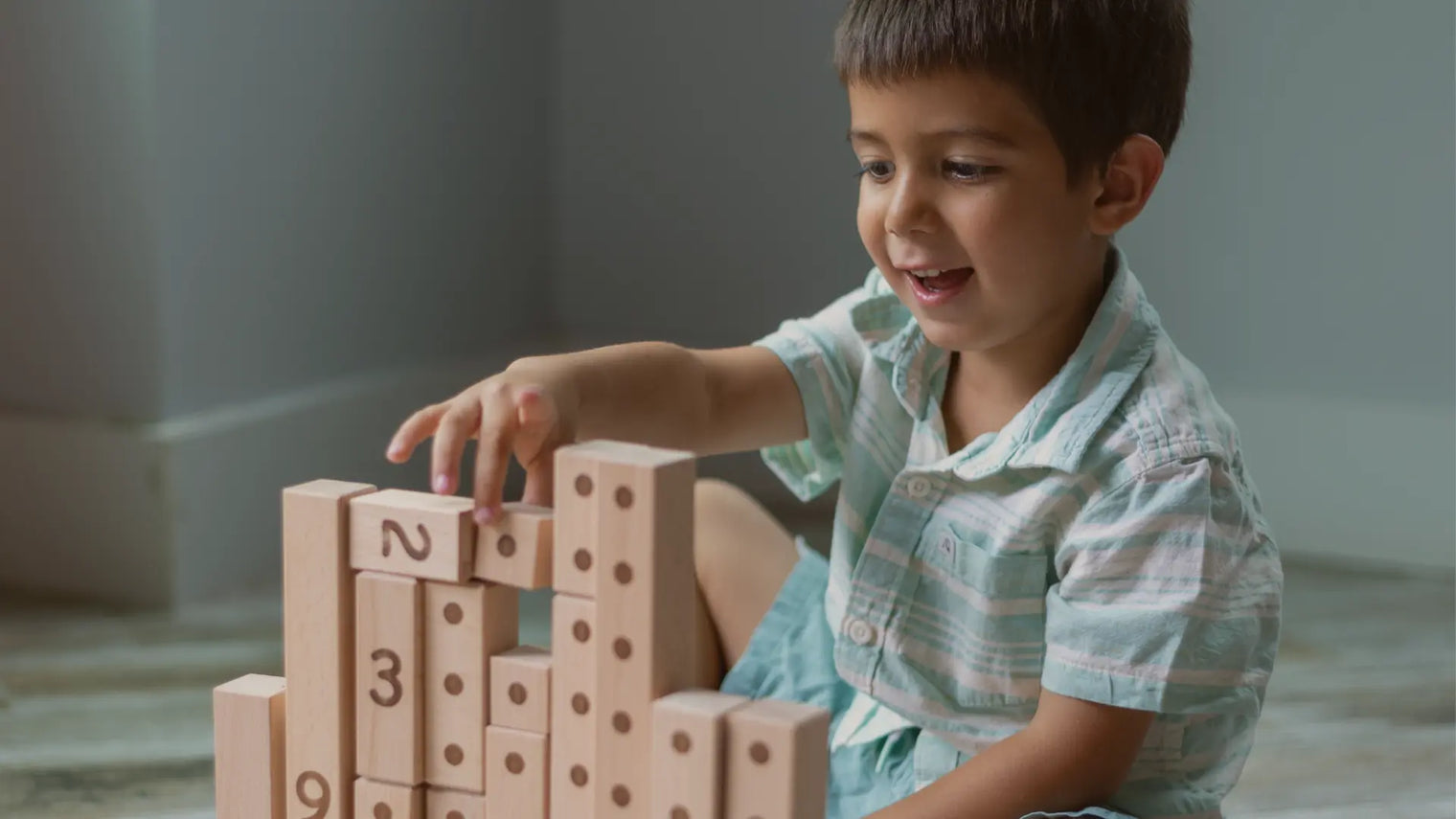Discover the benefits of Montessori wooden number blocks for kids. Enhance math skills, motor coordination, and social skills through play.
In the realm of childhood education, Montessori wooden number blocks stand out as a timeless and effective tool. These blocks are not just simple toys; they are a gateway to learning that combines play with education, fostering both cognitive and motor skills. In this article, we'll explore the multifaceted benefits of Montessori wooden number blocks and why they are a must-have in any child's educational toolkit.
Understanding Montessori Wooden Number Blocks
Montessori wooden number blocks, often referred to as stacking number blocks or number building blocks for kids, are crafted from high-quality wood and designed to teach children fundamental math concepts. These blocks are an integral part of Montessori education, which emphasizes hands-on learning and collaborative play.
What Makes Them Unique?
Montessori wooden blocks are unique due to their educational design and the Montessori philosophy behind them. Unlike traditional toys, these blocks are tailored to develop specific skills through interactive play. The simplicity of wooden blocks allows children to focus on learning numbers and counting without unnecessary distractions.
Cognitive Benefits of Number Blocks for Kids
1. Enhancing Mathematical Skills
At the core of Montessori number blocks is their ability to help children understand and internalize basic mathematical concepts. Children begin to grasp number sense by seeing and feeling the relationship between different values. For example, a block labeled “5” might be five units long, making it physically larger than a “2” block, giving children a visual and tactile understanding of quantity.
This approach introduces children to concepts such as:
-
Counting and number sequencing
-
Addition and subtraction
-
Greater than / less than comparisons
-
Place value and early multiplication
Manipulating blocks in a structured or free-play environment helps children connect the abstract world of numbers with the physical world, building a strong foundation for more advanced math skills.
2. Developing Problem-Solving Abilities
When children engage with number block games for kids, they are encouraged to solve puzzles and overcome challenges. This process enhances their problem-solving abilities and critical thinking skills. As children stack and arrange the blocks, they learn to approach problems methodically and creatively, which is a crucial skill for academic success.
Physical Benefits: Building Fine Motor Skills
3. Improving Hand-Eye Coordination
The physical act of stacking number blocks requires precision and coordination. As children handle the blocks, they enhance their hand-eye coordination and dexterity. This skill is essential not only for academic tasks but also for everyday activities such as writing and sports.
4. Encouraging Spatial Awareness
Montessori number blocks also promote spatial awareness, a fundamental skill for subjects like geometry, architecture, and engineering. As children stack blocks, compare lengths, or build balanced structures, they learn how objects occupy space and relate to one another.
This hands-on experimentation teaches children concepts such as:
-
Balance and symmetry
-
Size comparison
-
Patterns and sequences
-
Part-to-whole relationships
These are essential pre-math and pre-science skills that form the basis for future STEM learning.
Emotional and Social Benefits
5. Building Confidence and Independence
Montessori wooden block sets encourage independent play, allowing children to explore and learn at their own pace. This autonomy fosters self-confidence as children achieve small victories through play. The sense of accomplishment they feel when completing a number block puzzle boosts their self-esteem and motivates further learning.
6. Promoting Cooperative Play
Though Montessori blocks support independent learning, they also encourage cooperative play among peers. Children can work together to solve puzzles or create structures, enhancing their social skills and ability to work as part of a team. This collaborative aspect of play is crucial for developing communication and interpersonal skills.

The Educational Philosophy Behind Montessori Wooden Blocks
Hands-On Learning
The Montessori philosophy is grounded in experiential learning. Instead of memorizing facts or following rote instructions, children learn by doing. Wooden number blocks offer the perfect medium for this kind of learning—tactile, visual, and open-ended.
For instance, rather than teaching children that 4 + 3 = 7 using a worksheet, a Montessori guide might encourage a child to physically combine a “4” block and a “3” block and compare the height to a “7” block. This makes math concepts tangible and memorable.
Encouraging Exploration and Curiosity
Montessori materials are intentionally designed to spark curiosity. When children are left to explore number blocks at their own pace, they begin asking questions: “Why is this block longer?” “How many of these fit into that one?” These questions naturally lead to deeper thinking and independent discovery.
This sense of wonder and inquiry lays the groundwork for a lifelong love of learning.
Choosing the Right Montessori Wooden Block Set
Quality and Safety Considerations
Because Montessori materials are meant to be used regularly and for years, quality is paramount. Look for blocks made from sustainably sourced, non-toxic wood that has been smoothed and sealed to prevent splinters. Paints or finishes should be water-based and free from harmful chemicals.
The best Montessori number blocks are sturdy, easy to handle, and thoughtfully crafted to align with Montessori principles. Avoid sets that are overly decorative or feature excessive branding or cartoonish designs—they can detract from the simplicity and focus that Montessori promotes.
Age Appropriateness
Not all wooden number blocks are created equally. Some sets are designed for toddlers, introducing basic numbers and simple stacking. Others are geared toward preschoolers and early elementary-aged children, offering more complexity with arithmetic challenges and puzzle components.
When choosing a set, consider:
-
Your child’s developmental stage
-
Their current interest in numbers and problem-solving
-
Whether the set offers room to grow and explore new concepts over time
A well-chosen set should engage your child immediately while also offering new challenges as they develop.
Conclusion: Are Montessori Wooden Number Blocks Good for Kids?
In conclusion, Montessori wooden number blocks are an excellent educational tool for children. They offer a wide range of cognitive, physical, emotional, and social benefits that support holistic development. By investing in these blocks, parents and educators provide children with the resources they need to thrive in their educational journey. Whether used in a classroom setting or at home, Montessori number blocks are a valuable addition to any child's learning experience. Discover Dannico's Montessori Wooden Number Block and Flashcard set or more top Montessori toys for early learning.

